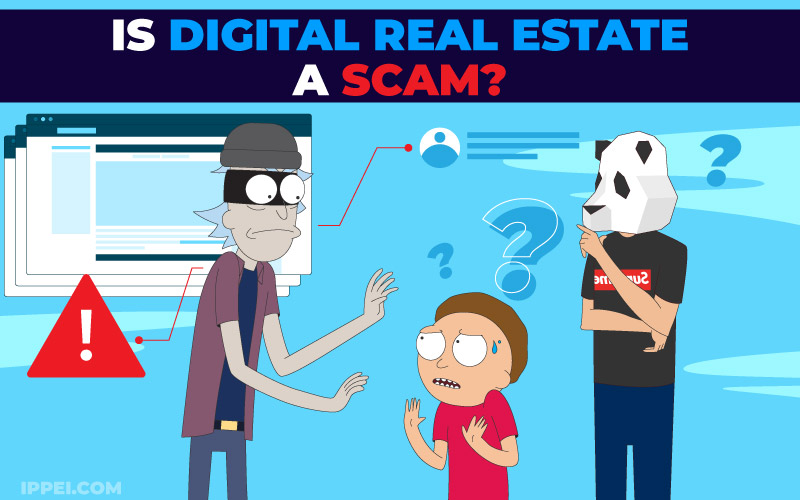The world is changing, and so are the ways we make money. In recent years, the rise of digital real estate has been a hot topic of discussion. But what exactly is digital real estate, and is it a legitimate way to make money?
Digital real estate refers to the creation and ownership of websites, social media accounts, and other online properties that generate income through advertising or affiliate marketing. Some people have made a fortune by buying and selling these digital assets, while others have turned them into profitable businesses. However, with any new trend come questions about its legitimacy. In this article, we will explore the world of digital real estate and answer the question: is it a legitimate way to make money?
Is digital real estate legit?
Yes, digital real estate is a legitimate investment opportunity. It involves purchasing and developing virtual assets such as websites, domain names, and social media accounts, with the aim of generating income through advertising, affiliate marketing, and e-commerce. However, as with any investment, there are risks involved, such as changes in algorithms and shifts in consumer behavior. It is important to conduct thorough research and due diligence before investing in digital real estate.

Is Digital Real Estate Legit?
Digital real estate is a term that refers to the ownership of virtual properties. These properties can range from domain names to websites, social media accounts, and more. With the rise of the digital age, the concept of digital real estate has gained popularity among investors and entrepreneurs. However, many people are still skeptical about its legitimacy. In this article, we will explore the legitimacy of digital real estate and how it can be a profitable investment.
What is Digital Real Estate?
Digital real estate refers to virtual properties that can be bought, sold, and rented just like physical real estate. It includes domain names, websites, social media accounts, and other digital assets that can generate income. Digital real estate is not a new concept, but it has gained more attention in recent years as more businesses shift their operations online.
Benefits of Digital Real Estate
There are several benefits of investing in digital real estate. Firstly, it is a low-cost investment compared to physical real estate. You don’t have to worry about maintenance costs, property taxes, or other expenses associated with physical real estate. Secondly, digital real estate has the potential to generate passive income. Once you have acquired a digital asset, you can monetize it through various means such as advertising, affiliate marketing, or selling products.
How to Invest in Digital Real Estate
Investing in digital real estate requires some research and strategy. One of the most common ways to invest in digital real estate is by purchasing domain names. You can buy a domain name that is relevant to your niche or industry and sell it at a higher price later. Another way is to acquire websites that have a high potential for growth and monetization. You can also invest in social media accounts that have a large following and engagement rate.
Is Digital Real Estate Legit?
The legitimacy of digital real estate depends on several factors. Firstly, it is important to ensure that the digital asset you are investing in has a legitimate source of traffic and revenue. You should also check if the asset has any legal issues or disputes. Secondly, you should be aware of the risks involved in investing in digital real estate. The value of digital assets can fluctuate rapidly, and there is always a risk of losing your investment.
Digital Real Estate vs Physical Real Estate
Digital real estate and physical real estate have their own pros and cons. Physical real estate is a tangible asset that can appreciate in value over time, but it requires a significant amount of capital and maintenance costs. Digital real estate, on the other hand, is a low-cost investment with a potential for passive income. It also allows for remote management and flexibility.
How to Mitigate Risks in Digital Real Estate
To mitigate risks in digital real estate, it is important to do your due diligence and research. You should have a clear strategy and plan for how you will monetize the digital asset. It is also recommended to diversify your portfolio and invest in multiple digital assets to spread out your risk. Lastly, you should stay up-to-date with trends and changes in the digital landscape to ensure that your investments remain relevant.
Conclusion
Digital real estate is a legitimate investment opportunity that can provide passive income and flexibility. However, it is important to do your research and mitigate risks to ensure a successful investment. With the right strategy and approach, digital real estate can be a profitable addition to your investment portfolio.
Freequently Asked Questions
What is digital real estate?
Digital real estate refers to virtual properties that can be owned and monetized, such as websites, domain names, social media accounts, and mobile applications. These properties can generate income through advertising, affiliate marketing, e-commerce, or by selling them for a profit.
Investing in digital real estate can be a lucrative business, but it requires knowledge, skills, and resources. It’s important to research the market, identify profitable niches, and create valuable content or products that attract and retain users.
Is digital real estate legit?
Yes, digital real estate is a legitimate and growing industry that offers many opportunities for entrepreneurs, investors, and content creators. However, like any other business, it’s important to do your due diligence and avoid scams, frauds, and unethical practices.
Some common scams in digital real estate include buying fake traffic or followers, using black hat SEO techniques, stealing content, or selling low-quality products. To avoid these risks, it’s recommended to work with reputable platforms, use ethical marketing strategies, and provide value to your audience.
How can I invest in digital real estate?
There are many ways to invest in digital real estate, depending on your skills, interests, and budget. Some popular strategies include:
– Buying and flipping domain names: This involves purchasing domain names that have high potential value, such as short or memorable names, and reselling them for a profit.
– Building and monetizing websites: This involves creating websites that offer valuable content or services, and generating income through advertising, affiliate marketing, or e-commerce.
– Investing in social media accounts: This involves buying or building social media accounts that have a large and engaged audience, and monetizing them through sponsored posts or affiliate marketing.
– Developing and selling mobile applications: This involves creating mobile applications that solve a specific problem or entertain a specific audience, and selling them on app stores or through private sales.
What are the benefits of digital real estate?
Digital real estate offers many benefits compared to traditional real estate, such as:
– Lower entry costs: You can start a digital real estate business with a few hundred dollars, whereas traditional real estate requires thousands or millions of dollars.
– Higher scalability: You can reach a global audience with digital real estate, whereas traditional real estate is limited by location and physical space.
– Lower maintenance costs: You don’t need to maintain physical properties with digital real estate, which saves you time and money on repairs, renovations, and utilities.
– Higher flexibility: You can work from anywhere with digital real estate, which gives you more freedom and mobility than traditional real estate.
What are the risks of digital real estate?
Digital real estate also has some risks and challenges, such as:
– High competition: The digital real estate market is crowded and constantly evolving, which makes it harder to stand out and succeed.
– Technical skills required: Digital real estate requires some technical skills, such as web design, coding, SEO, or analytics, which may be challenging for some people.
– Cybersecurity risks: Digital real estate is vulnerable to cyber attacks, such as hacking, phishing, or malware, which can compromise your data, reputation, or revenue.
– Market volatility: Digital real estate is subject to market trends and changes, such as algorithm updates, new regulations, or economic downturns, which may affect your income and growth.

How To Make Money With Digital Real Estate in 2023 (For Beginners)
In the world of business and investments, digital real estate is a relatively new concept that has been gaining momentum in recent years. With the advent of the internet and the rise of e-commerce, the value of digital assets has increased significantly. However, many people are still skeptical about the legitimacy of digital real estate as an investment opportunity.
Despite the skepticism, it is important to note that digital real estate is a legitimate investment opportunity with the potential for high returns. As more and more businesses move online, the value of digital assets such as domain names, social media accounts, and websites is only going to increase. Additionally, the rise of non-fungible tokens (NFTs) has created a new market for digital assets that is quickly gaining in popularity.
In conclusion, digital real estate is a legitimate investment opportunity that should not be overlooked. While there are risks involved, the potential for high returns makes it a worthwhile venture for those who are willing to put in the time and effort to understand the market. As technology continues to evolve and the world becomes increasingly digital, the value of digital assets is only going to increase, making digital real estate a smart investment choice for the future.


